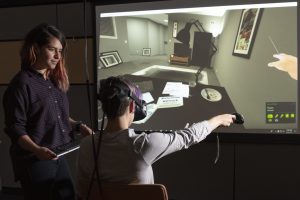Los Angeles, Oct 17 (EFE).- Virtual reality technology allows users to experience what it is like to lose everything, increasing people’s levels of empathy toward the homeless, according to the findings of a Stanford University study that were published on Wednesday.
The “Becoming Homeless” virtual reality experience, developed by Stanford’s Virtual Human Interaction Lab, seeks to allow any person to feel what it is like to lose one’s job and home, and be forced to live on the street.

Steve Preminger, special advisor for Santa Clara County, said that the experience is harrowing and gave him the resolve to find solutions.
“I felt desperate. Unable to continue on. Thankfully the exercise ended. But I was shaken, and left with resolve to find solutions to the many whose lives are exactly like this, who aren’t living through an exercise,” he said.
Another participant, Samuel Sharkey, acknowledged that the experience made him more compassionate toward the plight of the homeless.
“To be able to imagine oneself in the position of becoming homeless breaks down the barrier between ‘us’ and ‘them’ and opens up possibilities for justice,” Sharkey said.
According to the study, people who experienced what it is like to lose their jobs and homes through virtual reality developed longer-lasting compassion toward the homeless compared to those who viewed other media versions of the scenario, including text and television footage.
The research revealed that 83 percent of participants in the virtually reality experience signed a petition supporting affordable housing, compared to 65 percent of people who read a narrative that asked them to imagine what it would be like to be homeless.
Fernanda Herrera, a graduate student at Stanford’s Department of Communication and lead author of the research paper, said that some 10 million virtual reality (VR) headsets have been sold in the United States in the last two years.
“Many people now have access to VR experiences. But we still don’t know much about how VR affects people. This research is an important step in figuring out how much of an effect this technology can have on people’s level of empathy in the long term,” Herrera said.
The research paper, which was published on Wednesday in PLOS ONE, in based on two two-month-long studies with more than 560 participants between 15 and 88 years old, representing at least eight different ethnic backgrounds.
